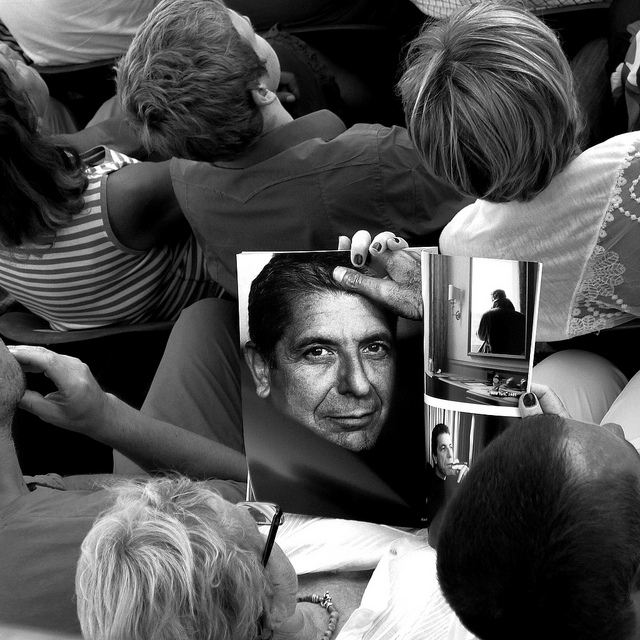
“He new exactly where he was going, and he was headed there in a hurry—and at the same time, he was incredibly gracious, the most gracious host this side of my mother.” ~ David Remnick, The New Yorker
Yesterday (November 12th, 2016) at about 3 p.m., I headed out to Parc Portugual in Montreal, across from Leonard Cohen’s apartment, to join a few hundred people singing Leonard Cohen songs in a vigil entitled “A Perfect Offering.”
It was humble, modest, just a plain old gathering—there was nothing flashy about it. It wasn’t advertised, mostly word of mouth. This was apt, given that Leonard didn’t particularly love the stage: he had intense stage fright that he faced for much of his (early) career, claiming,
“I think something’s wrong every time you begin to applaud.”
From the blrightly tiled bandstand, two people with guitars led the audience in renditions of some of his most popular songs: “Hallelujah,” “So Long Marianne,” “Anthem.” A white mural sat on the ground, designed sort of like a patchwork quilt, that kids were coloring on. People sang and faced video and still cameras toward the tiled bandstand. The wind was bitter, the sky grey, the mood calm.
I went there because I wanted to feel something. I hadn’t mourned much after his death, in part because he seemed to be the type of person who, as a follower of Buddhist philosophy, was accepting of his death. As a poet, he explored the idea of death at every corner, from every angle. He seemed to have come to terms with the fact that it is—well, a fact.
Almost all humans, spiritual or poetic or not, know what it is to question death over and over, to look into that fear and finally hope we can someday come to terms with the idea that maybe, just maybe, it might not be the worst thing in the world. And if he did reach that point—which he seems to have—that’s a most admirable state, to not fear death.
Selfishly, I went to the vigil because I was seeking a connection with the crowd, something like eye contact, some shared tears, a hug. But the weird thing was that it felt very insular—or maybe I felt very insular. But I think that that sense of loneliness is something that he has always brought to us as well.
Leonard had (has) this uncanny knack of bringing us together in our loneliness—we are lonely, yet we still sing. Or play music. Or write poetry. Or whatever our particular creative path is. The creative path must be lonely, to an extent. The loneliness needn’t always be a dark type, but we have to see the darkness too. And to get deep into creative flow, many of us must adhere to the delicate balance between staying intimately connected with the world and carving out (often long) stretches of solitude.
So I guess part of that feeling of immense isolation was, or is, a part of the grieving: for my ill father, for this, for the elections. I’m supposed to be feeling something now, but I guess I’m somewhat numb.
In the 1965 National Film Board Leonard Cohen documentary, Ladies and Gentlemen, an interviewer is sort of needling him to talk about what he is “bothered” by. Leonard’s answer:
“When I get up in the morning, my real concern is to discover whether or not I’m in a state of grace.”
I thought that was a pretty good daily goal, and vowed then to keep sticking with the poets.
May we always seek grace. May we always find poetry.
What a gift.
~
Prayer for Messiah
His blood on my arm is warm as a bird
his heart in my hand as heavy as lead
his eyes through my eyes shine brighter than love
O send out the raven ahead of the dove
His life in my mouth is less than a man
his death on my breast is harder than stone
his eyes through my eyes shine brighter than love
O send out the raven ahead of the dove
O send out the raven ahead of the dove
O sing from your chains where you’re chained in a cave
your eyes through my eyes shine brighter than love
your blood in my ballad collapses the grave
O break from your branches a green branch of love
after the raven has died for the dove.
The Last Interview
“It’s very compassionate at this stage; more than any time in my life, I don’t have that voice that says, ‘You’re f*cking up.’ That’s a tremendous blessing.”
Leaving the Table, a song from his last album.
I don’t need a reason
For what I became
I’ve got these excuses
They’re tired and they’re lame
I don’t need a pardon, no no, no no, no
There’s no one left to blame
I’m leaving the table
I’m out of the game
Author: Renée Picard
Image: marc cornelis at Flickr , Flickr/Bill Strain
Editor: Travis May


 Share on bsky
Share on bsky




Read 0 comments and reply